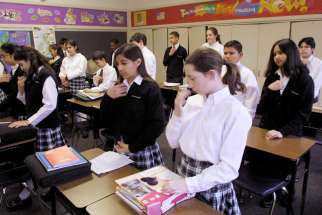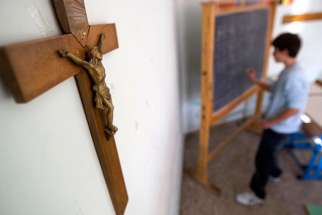The ‘irrational attack’ against Catholic schools
Many years ago, a person named Margaret Wente called and offered me a job at the Globe and Mail newspaper, which I accepted. Many, many years ago, I passed through the Catholic school system in Toronto, elementary school at Holy Cross and high school at Neil McNeil.
Business as usual in Catholic schools
Jesse Jackson once said, “Text without context is pretext.” His comment applies to the recent discussions around an Ontario Divisional Court decision that clearly is pretext taken out of any contextual understanding.
Video contest gets the word out on the Catholic school experience
A group of six Grade 8 students from Woodstock, Ont., captured top prize in a video contest to extoll the value of Catholic education.
Cardinal Collins defends the rights of Catholic Education
[Updated at 12/10/12, 10:30 a.m.]
In a rebuke to comments made by Education Minister Lauren Broten, Cardinal Thomas Collins told a packed audience that the identity of Catholic schools must be respected and the mission of Catholic schools includes engaging in pro-life activities.
Collins made his comments to 1,700 people at the annual Cardinal's Dinner on Thursday night a day after Broten suggested that under the province's new anti-bullying legislation Catholic schools should not be teaching that abortion is wrong because "Bill-13 is about tackling misogyny."
"Taking away a woman's right to choose could arguably be considered one of the most misogynistic actions that one could take," she said at a press conference. "I don't think there is a conflict between choosing Catholic education for your children and supporting a woman's right to choose."
Collins did not specifically mention Broten, and neither she nor Premier Dalton McGuinty attended the dinner at Toronto's Metro Convention Centre. The Ontario government was represented by Minister of Citizenship and Immigration Charles Sousa. He heard the cardinal defend the rights of Catholic education in no uncertain terms.
Collins said the Catholic identity of Catholic schools is "recognized and protected" by section 93 of the constitution and by section 1 of the Education Act.
"Both the constitution and the Education Act make it clear that the Catholic identity of the school must be respected," he said.
Then, referring to Bill-13, the government's anti-bullying legislation, he said:
"This is true when it comes to the establishment of anti-bullying groups designed to make the school a better place for all, and in Catholic schools that means following the method outlined in the document Respecting Difference, of the Ontario Catholic School Trustees Association. It is our mission to speak up for all those who suffer, and especially those who are voiceless, for those who are forgotten.
"It is also true when it comes to protecting the freedom of all in the school community to engage in pro-life activities in order to foster a culture of life in which the most vulnerable and voiceless among us are protected and honoured throughout their whole life on earth from the moment of conception to natural death.
"Defending the voiceless is our mission."
Collins reminded the audience that Catholic education has been an integral component of Ontario schooling since before Confederation. He said the province was blessed to have a religious and non-religious education system that "work together in co-operation to make education a treasure for which all Ontarians may truly be thankful."
"There is more beauty in the variety of a garden than in the uniform, undifferentiated, monotony of the dull flat surface of a parking lot," he said.
"The complementary variety in our educational system is an advantage for all, producing not only a healthy competition from which all benefit, but also a fruitful collaboration, and the richness of different approaches to the key issues of life.
"That diversity reflects the reality of the differences that exist in our province. The system works."
Broten, who doubles as the minister responsible for women's issues, made her comments on Oct. 10 after Campaign Life Coalition (CLC) held a press conference at Queen's Park to promote weekend rallies that will demand the province stop funding abortion through Ontario health insurance. The CLC press conference was sponsored by three Conservative MPPs.
In posing a question to Broten, a reporter said "the Catholic school system in this province is teaching the kind of intolerant thought that we saw coming out of that (CLC) press conference. They let kids out of school to go to anti-abortion rallies. Is that appropriate?" When Broten dodges that question, a reporter again asked: "Should schools be encouraging kids to go to anti-abortion rallies?"
"In Ontario, we support Catholic education, support the teaching of love and tolerance in our schools and at the same time we support the right to chose." she replied. "I am one that supports Catholic education and has been adamantly inn support of women's right to chose for many years and I do not see a conflict in those."
Catholic schools exist to assist committed families and their parishes celebrate and live their faith in our communities. But people sometimes say this triad of school, church and family is no longer functional. Yes, it can be challenging to keep all the partners working in harmony, but it is a challenge we must never abandon because the result of failure is a weakening of our faith community.
When examining the early Church and how Jesus lived with His disciples we find six consistent elements of their life together. They were welcoming, celebrating, learning, reconciling, serving and praying with each other and the larger community. We must seek the same things in our parish-school relationships.
There are many teachers, parents and priests working to make this relationship more meaningful. It is a task the entire Catholic community must embrace if it is to achieve continuous improvement of our schools. At Vatican II, the Church shifted its emphasis from institution to community. Its Declaration on Education said a “Catholic school is distinguished by an attempt to build community, permeated by the Gospel spirit of freedom and love.” But this concept of community should never be truncated to just the local school. It must include the larger concept of community, embracing the parish, the school and the family. We cannot think of our Catholic community without recognizing that a community only exists if it includes all three of these pillars.
Building this community requires hard work and common sense. First, it obligates us to see the importance of this relationship and strive to make it work. It means abandoning traditional ways of doing things and not imposing our will on others (“thy will be done,” not my will be done.)
Second, let’s recognize our strength when we work together, acknowledging each other’s importance but not exclusive right. It is precisely because we form a partnership that we should be freed from the egoism and self-centred and controlling ways that often mark the secular world.
Finally, we need to seek opportunities to illustrate this partnership to students, teachers and parishioners. Our community must see the concrete ways this relationship can be made viable and enriching for all. We become stronger as a Catholic community when we give words to what we profess. But we must be mindful that this relationship is often fractured when adult concerns are imposed on our schools and when we ignore the unique role filled by Catholic schools.
The need for parish, school and home to work together has never been greater. Below are suggestions to help achieve that goal:
-
o At registration, principals should invite the parish priest to help greet new parents. There should be a letter of welcome from the pastor as well as the principal, and recognition that registration is an opportunity to demonstrate to parents the importance of co-operation between parish, school and home.
-
o Meetings are a reality of modern life so make them productive. The local priest should be invited to address the faculty at one of their first meetings and the principal should be invited to speak to the Knights of Columbus, Catholic Women’s League or the parish council. Principals and pastors should meet quarterly, possibly over lunch or breakfast.
-
o Schools should be unwavering advocates for the parish and likewise the parish for its Catholic schools.
-
o While there may be issues of a larger nature confronting the school system or Church, work at improving one parish and one school at a time.
-
o Building relationships is essential, so even in large parishes one priest should be designated as the contact for each school and, likewise, the principal should be the main contact with the parish, not a chaplain, other school administrator or teacher.
-
o The parish bulletin should provide space each month for information about what is occurring in schools from a religious perspective, and the school newsletter should provide space for the pastor to provide information about the liturgical cycle, upcoming feast days, prayers, etc.
-
o Schools and parishes should work together on holding missions or retreat days that can include a talk by the local priest, student involvement and community prayer and fellowship.
-
o Create a pastoral plan in September that outlines events that the parish and school will do jointly and publish the calendar in the parish and school bulletins.
-
o Parishes should provide a bulletin board for schools to show off student achievements and share school news, and schools should do likewise for parishes to promote church events.
-
o All school newsletters should contain the parish Masses and organizations and all parish bulletins should contain school information.
-
o In the event of significant curriculum changes, school officials should discuss them with the priest, just as the priest should discuss with principals any new approaches to the celebration of the sacraments.
-
o Link parish youth ministers with the local school and work together on events and ministry.
-
o Priests should regularly proclaim from the pulpit the value of Catholic education, and become regular visitors to secondary schools. The local priest should not be a stranger to the community.
-
o School councils should have a parish rep to facilitate two-way communication, keeping the pastor informed on school matters and the school informed on parish issues.
-
o Vocation days or vocation weeks should be a hallmark of our schools. Schools should have a vocation plan beginning in elementary school that stresses lay vocations and the vocation to religious life.
-
o Schools should encourage faculty after-school retreats as a way for staff to link to the local parish and engage in prayer, socializing and sharing a common mission.
-
o Schools should consider holding drop-in Fridays, where a parish priest can drop by as school is dismissing to talk to staff. No agenda, just coffee, treats and dialogue between the staff and the priest.
-
o Involve the local school trustees by inviting them to meet with the Knights of Columbus and Catholic Women’s League, address the parish after Mass or speak at schools on an information night.
-
o The pastor and the principal should be on each other’s speed dial.
People looking for perfection in our Catholic homes, schools and churches will be horribly disappointed. They all are populated with struggling people. So make a list of complaints if you must, but then tear it up, because there is already too much to do and so much at stake.
(John B. Kostoff is the Director of Education for the Dufferin-Peel Catholic District School Board and the author of Auditing Our Schools.)






